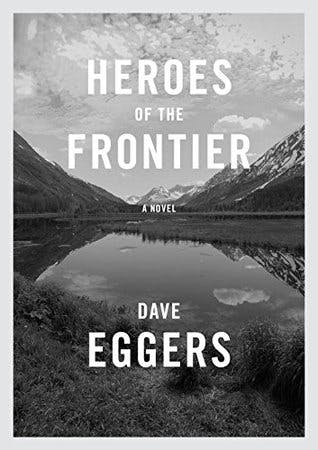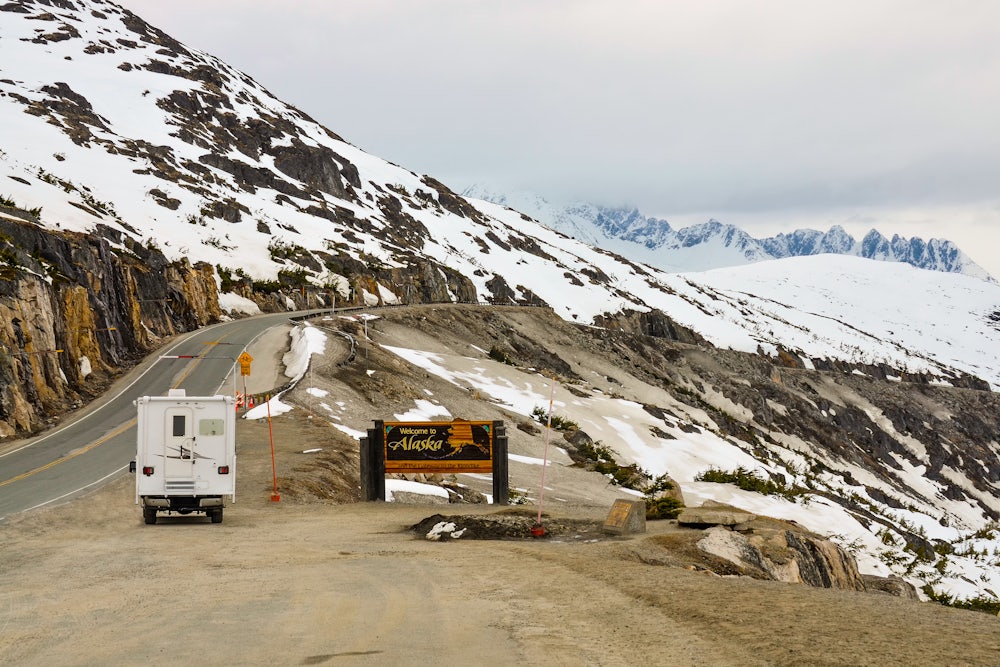Dave Eggers’s new novel Heroes of the Frontier is about a woman named Josie, short for Josephine. I was unnerved by this coincidence, although I don’t know what else it could have been short for. Heroes of the Frontier is about a normal woman acting abnormally, her antics challenging the reader to draw the line between bold adventurer and bad, neglectful mother. She’s not the sort of challenge you want to share a name with.

Josie is on an odyssey across Alaska, away from her life of Ohio dentistry and a shitty ex. We do not know at first what she is looking for. Josie’s two kids, eight-year-old Paul and five-year-old Ana, are not quite securely fastened in the back of the disintegrating rental RV. Ghosts from Ohio haunt Josie as she drives from RV park to RV park. She meets men and the kids swim in rivers. Everything in Alaska is too expensive. A tank of gas apparently costs $212 there, although Eggers doesn’t explain why (and I don’t know the reason). Josie’s daughter picks up an otter skull on the beach. Her son knows how to find a first-aid kit. The memory of her children’s spineless and loose-boweled father haunts Josie, but memories of two former patients crowd around even more closely: a saintly young military man and an old harridan named Evelyn, who destroyed Josie’s dental practice with a lawsuit.
That lawsuit is just one hillock in the great panorama of disaster that is Josie’s past. Her parents were drug-addicted nurses implicated in a healthcare scandal. Under the guidance of a caring woman named Sunny, Josie emancipated herself as a teenager. Now, Josie has no family but her own children, and herself. As she tries to define that self, Josie’s dental-patient ghosts won’t stop keening. These characters, the one dead of war and the other of a cancer she accuses Josie of not detecting in time, slightly over-determine the sort of America Heroes of the Frontier represents. That America is defined by conflict, as its people wage war in Afghanistan and, at home, on each other. But it isn’t untrue.
So, the stakes of this journey are high. Josie is not just looking for an un-Ohian freedom in Alaska’s forests and waters and highways. She’s looking for an experience of the sublime that will help her make sense of the choices she has made, the conflict which defines her country, and the future she has to knit out of such crappy raw materials in order to lead a good life. This type of story—“woman on a journey to self-discovery”—resonates with sophisticated American adventure-novels like Nell Zink’s The Wallcreeper, but also shares something with the writing of Cheryl Strayed, even Elizabeth Gilbert. At times Eggers seems to shoot for the former and end up with a pastiche of the latter.
Eggers shows us a woman on the run, and asks, is this okay with you? He doesn’t mean to ask whether or not women should get to drive RVs, or whether or not Alaska is dangerous or better or worse than Ohio. Instead, Eggers takes the model of the questing hero and makes her a mother of vulnerable kids who doesn’t bring them home in time for the start of the semester and who keeps ordering second and third and fourth glasses of wine.
The image of a mother drinking a large glass of wine by herself is kind of hackneyed, and it’s a flaw in the book. To grab an example at random, the Welsh cop show Hinterland tracks its main female character’s ups and downs through red wine. When she gets home and immediately uncorks, you should worry. When she puts the bottle of Pinot back on the rack with decision, you can relax. The same thing happens in this book. It’s often boring to feel dread creeping over you as our heroine beckons the waitress back over, or (even worse) drinks in the driver’s seat.
But if we’re generous about the wine stuff, Eggers does something interesting with his problem. Josie’s journey undoubtedly puts her children in danger at some points, but also brings them toward exceptional new experiences. Should we take Eggers’s meaning to be a warning about contemporary parents’ obsession with safety and convention, a demand that we teach our kids to swim by throwing them off piers as in days of yore? Or is he asking something simpler, but more difficult: Can we permit troubled mothers?
The resulting novel is pretty absorbing, but has some strange genre issues. Eggers’s chief tools for inserting symbolic meaning into Josie’s chaos are children and pathetic fallacy. With this formal one-two punch, Eggers has somehow managed to mash the Victorian novel into the contemporary American family epic. Imagine Maggie Tulliver as the protagonist of The Corrections.
Eggers relies on the children for comic relief and for wisdom. Ana and Paul’s one-liners leaven the novel’s slightly dismal tone, and also cast them as naïve truth-tellers. At one point they bring their mother a card “dictated by Ana and written by Paul, which said, ‘I love you Mom. I am a robot.’” Isn’t that sweet—children have feelings, but they’re also kind of weird aliens! Later, Ana catches sight of a note Josie writes before the family leaves a host without saying goodbye—an ominous moment in the book, that is treated ambiguously. “‘That’s a short note,’ she says.” The chapter ends.
This strategy is a little cloying, and opens the book to the charges leveled by n+1 at Eggers in 2004. Eggers had published his Pulitzer-finalist memoir A Heartbreaking Work of Staggering Genius four years earlier, and his literary journal Timothy McSweeney’s Quarterly Concern was a full 6 years old. Eggers’s publishing house (also called McSweeney’s) had been producing the bimonthly magazine The Believer for a year. All of these ventures were suffused by humor and charm. But, by the same token, readers who preferred sharper teeth to their criticism found Eggers’s output twee, even sentimental. n+1 called Timothy McSweeney’s Quarterly Concern “wide-eyed, juvenile, faux-naif.” They suggested that sentimentality and satire—McSweeney’s twin wheelhouses—mixed badly.
But Eggers’s novels of recent years—including A Hologram for the King (2012), the tech-satire The Circle (2013), Your Fathers, Where Are They? And the Prophets, Do They Live Forever? (2014)—have received less attention, which perhaps has been a good thing. Sentimentality feels okay when a book is about motherhood, and Heroes reads like a writer finding his subject at last.
The pathetic fallacy is harder to forgive. Eggers weaves a long, ambiguous journey of a novel that pits his heroine between madness and the sublime. Why escalate this complicated outdoors adventure into a face-off with—no joke—an electrical storm? Is this about grappling with the past in order to face the future, or is this domestic Homeward Bound? I just don’t know.
Heroes of the Frontier finally does deliver an answer to its own questions about madness and motherhood, but the questions are better. The ending is corny, and it ties the book up with a bow it doesn’t deserve. But if you can forgive slightly stereotyped woman protagonists, Eggers’s novel repackages frontiersmanship into a diverting new form. That form doesn’t feel urgent, or zeitgeisty in the way of Eggers’s other fiction has, but that is no reason not to read a book.
